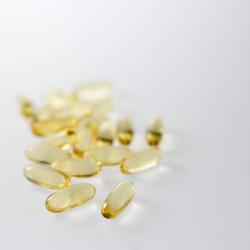There’s Nothing Fishy about Fish Oil
We’ve all heard about the health benefits in fish oil, which can be easily taken in capsule or liquid supplement form. Taking fish oil gives you more Omega-3 fatty acids, as well as often containing Vitamin A, C, D, or other valuable ingredients.

Fish oil can easily be taken in capsule or liquid supplement form.
Some of the amazing effects fish oil has been found to have are:
- Enhancing your immune system
- Boosting your memory
- Reducing inflammation
- Decreasing risk of certain cancers
- Improving bone health
- Improving the look of hair and skin
- Reducing the risk of heart disease
- Helping eye conditions such as glaucoma and macular degeneration
- Preventing pregnancy complications
- Improving concentration in children and adults
Our bodies simply cannot produce Omega-3 oils on their own, and we need to supplement that by eating fish or taking fish oil. These fats can be found by eating fish twice per week, if you prefer to get your Omega-3s direct from their source. If you’re eating fish often, be sure it’s baked, grilled or steamed. Frying it seems to reduce the nutritional benefits. The alternative is a molecularly distilled fish oil supplement with no heavy metals.
How Do I Know What the Good Ones Are?
The quality of fish oil supplements is greatly varied, and you must be sure that it is a high-quality fish oil supplement you’re taking. So many vitamins bought off the shelf can be low quality and may not give your body what it needs. The two main fatty acids in fish oil are EPA and DHA. Your supplement should have:
- A minimum of 500 milligrams combined of EPA and DHA
- Third-party test results on the supplement’s label
- No fishy smell or taste; this could mean it has gone bad
- Certification that only non-endangered fish species were used
If you follow these four guidelines, your fish oil will provide you with all the valuable benefits that Omega-3 oils offer.